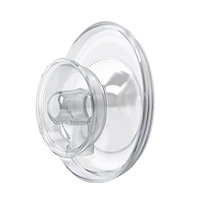Parenting is an immense responsibility. Keeping your child safe and happy while balancing the everyday demands of adult life is no mean feat. And if you’re juggling a full-time career, raising your child as a single parent, or you already suffer from mental health issues, mom burnout is even more likely.
If you’re struggling, remember that you’re not alone. Recent research found that more than half (57%) of parents are burned out. Raising a child may be one of the most rewarding life experiences, but it’s also regarded as one of the most difficult, so don’t beat yourself up if you’re feeling like it’s all getting a bit much.
But while there’s no magic cure for mom burnout, there are ways to minimize its impact on your day-to-day life.
What is mom burnout?
Mom burnout (sometimes referred to as parental burnout) is a state of physical, mental, and emotional exhaustion caused by the chronic stress of parenting.
It’s particularly challenging to deal with because, unlike the stress of a 9-5 job, its cause cannot be so easily escaped. There are no weekends off, and the day doesn’t end at 5 PM. You’re in it for the long haul, and this realization alone can often feel overwhelming.
Unlike general stress, mom burnout isn’t just about being overworked or tired — it’s a much deeper sense of depletion. You might feel detached from your role as a parent, for example. Some parents describe the level of exhaustion as feeling like they’re ‘running on fumes’. In other words, it’s the kind of stress that can’t be solved by a quick nap or a 15-minute stroll.
Is mom burnout the same as postpartum depression?
No. While mom burnout and PPD share some overlapping symptoms, they’re not the same thing. Postpartum depression is a clinical condition that often requires professional attention. Parental burnout isn’t officially recognized as a mental health condition, but that doesn’t make it any less real.
Remember: Mood changes and feelings of anxiety or unhappiness lasting longer than 2 weeks post-birth may be signs of postpartum depression. If your low mood is accompanied by thoughts about hurting yourself or your baby, or you’re unable to manage you and your baby’s essential daily needs, call your doctor, nurse, or midwife.
How do I tell if I’m suffering from mom burnout?
Raising a little one is tricky even when you’ve got all of the support you need, but for parents contending with factors like demanding careers, judgemental families, or a lack of stability, burnout is even more likely.
The bottom line is that while certain things might increase its likelihood, parental burnout can impact anyone, and it doesn’t mean you’re failing as a mom. In fact, it’s quite the opposite — most of the stress you’re feeling can be traced back to an intense desire to give your baby the best life possible!
You might be suffering from parental burnout if you experience any of the following:
A short temper and feelings of rage
Find yourself snapping at your partner, baby’s older siblings, or even your newborn over minor issues? Irritability is a hallmark of mom burnout, and is often linked to extreme fatigue.
Fatigue
This isn’t your run-of-the-mill tiredness, nor is it the kind that a quick nap on the sofa will solve. This is the kind of exhaustion that goes right through to your core. Some parents report feeling “zombified”. If the lights are on but no-one’s home, and everyday tasks feel utterly insurmountable, you’re fatigued — and that’s a strong sign of mom burnout.
Feeling inadequate as a parent
The fatigue and stress that accompany parental burnout often amplify anxiety or feelings of self-doubt. You might feel like you’re failing at parenting, or even falsely assume that your friends or partner see you as an inadequate mom. These thoughts can be hard to shake, and it can be tricky to convince yourself that they’re incorrect.
Feeling ‘empty’
This is one of the most common symptoms of parental burnout. You might feel detached or emotionally “numb”, and this can have a knock-on impact. You may choose to withdraw from your friends, or fail to engage with your baby during tummy time, for example.
Feeling isolated
You might feel like you’re the only one struggling — that you’re all alone in your parenting journey — and this immense pressure can have a huge impact. If you lack a support network or struggle to share your feelings with friends and family, this can exacerbate things.
Questioning your choice to become a parent
If you’re secretly wondering whether having a baby was the right decision, be assured that this isn’t unusual. Research suggests anywhere from 5-14% of parents have had these feelings — though we’d wager the prevalence is likely even higher.
Be assured that these feelings are not a reflection of your love for your child — it’s just a sign that you’re feeling burned out and in need of support.
Decreased productivity
If thoughts of working through your to-do list are tear-inducing, and simple chores feel monumental, this is another sign that you’re burned out.
Other types of mom burnout
Because mom burnout isn’t something medically diagnosed, it can look and feel different from one parent to the next. Below, we’ve outlined a few situations that may increase the likelihood of chronic stress and exhaustion.
Stay-at-home mom burnout
Stay-at-home parenting has a variety of benefits, but the constant availability and “always on” nature of it often leads to burnout. While attitudes are changing, society is often ignorant to the burden of home-bound moms. When you’re in the trenches of new parenthood (especially if you’re raising your first child) it’s easy to feel like your work isn’t appreciated, and this can intensify feelings of exhaustion and frustration.
ADHD mom burnout
If you’re a mom with ADHD (Attention Deficit Hyperactivity Disorder) the chaotic whirlwind of parenting can feel even more turbulent. Constant mental juggling, interruptions, and few opportunities for downtime may increase symptoms like forgetfulness, difficulty focusing, and impulsivity, leaving you doubly drained.
New mom burnout
New moms can sometimes find that the steep leaning curve involved with caring for a newborn creates the perfect storm for burnout. Pair this with a lack of sleep, hormonal changes, and the sudden shift in relationship dynamics — all the usual suspects — and it’s easy to see why it can be such an overwhelming experience.
How to recover from mom burnout
You’re feeling worn-out, used-up, and run-down. What now? Much like the physical recovery process from childbirth, your mind needs time to adjust to your exciting-but-terrifying new normal. Your transition to motherhood isn’t complete as soon as your baby is born; it’s an ongoing journey — and not one that can be rushed.
This said, there are some things you can do to ease your exhaustion and lighten the load.
Lean on your support network
Asking for assistance can feel awkward — we get it — but if you’re fortunate enough to have a support network, there’s no shame in using it. When you’re burned out, one of the best things you can do is reach out to friends, family, or trusted colleagues.
Whether it’s requesting an hour of babysitting, having a frank discussion with your partner about parenting responsibilities, or simply venting to another mom, a problem shared is a problem halved, so don’t hold back!
Managing without a support network
Don’t struggle alone. If you’re parenting without support, consider reaching out for help via the following methods:
Join local parenting groups: Try visiting your local parent meet-up or support group. There’s plenty to be gained just by chatting with other parents in similar situations, and these groups provide a safe space to share advice and make lifelong friendships.
Connect with other parents online: Online forums such as Mumsnet (UK-based but US-friendly!) or r/singlemoms are a lifeline for parents all over the world — and ideal if the thought of an in-person meeting gives you the heebie-jeebies.
Seek a helping hand: If resources allow, consider hiring a babysitter, nanny, or postpartum doula to give yourself some breathing room. Alternatively, look into local childcare co-ops or sliding-scale daycare options.
Switch up your approach to parenting
Parenting isn’t about achieving perfection; it’s about doing the best and adapting as you go. In fact, if we’re being less charitable, we might even say that a large chunk of motherhood is simply winging it.
In other words, don’t hold yourself to impossibly high standards. If you’re feeling overwhelmed, it might be time to take a step back and reassess your approach.
Try to set realistic expectations for yourself and your child. You can’t be everything to everyone, nor should you try to. Accept that, for now at least, you and your baby are the most important people in your life.
Aim to simplify your routines where you can. If breastfeeding is proving painful (and consequently sending your stress levels into orbit) consider expressing your milk and bottle-feeding instead. If your baby’s bedtime schedule is chaotic, try introducing a relaxing nighttime routine — this may help your tot to drift off more predictably. Tweak the things you can control, and you might just find that the bigger issues — emotional turbulence and physical exhaustion, for example — resolve themselves.
Try to prioritize self-care
When a tiny human is dependent on you for everything, taking care of yourself is often the least of your priorities. But while finding time in the day for a little “you time” is easier said than done, neglecting self-care is only likely to exacerbate feelings of burnout.
Self-care doesn’t necessarily mean booking an entire spa day or indulging in a full-blown pamper session; it simply means carving out a little time for yourself in between your caregiving responsibilities.
Of course, it helps to have a supportive partner or close family member who can step in and give you a break from time to time, but even snatching a few moments to yourself while your baby naps can make a world of difference to your physical and mental health.
Perhaps you’ll use the time to run yourself a hot bath, for example, or maybe just catch up on a little reading. In any case, it’s important to remember that you’re not just a caregiver — and there’s nothing selfish about focusing on yourself, even if it’s just for a few minutes every day.
Seek mental health support
Don’t suffer in silence. If you’re feeling overwhelmed, talking to a qualified professional — be it a doctor, midwife, counsellor or therapist — can help make it much easier to cope. Get in touch with your local clinic, or try contacting one of the following organizations for support:
How do I explain mom burnout to my partner?
Start by describing, to the best of your abilities, how you feel. Use concrete examples, like how you’ve been feeling more tired or irritable than usual, and explain that it’s not about them or your love for your child — it’s about the mental and emotional load you’re carrying.
Be specific about what you need. For example, you might say, “I’d really appreciate it if you could take over bedtime duties a few nights a week” or, “Could we schedule some alone time for me on the weekends?” Your partner can’t help if they don’t know what you’re going through or how they can pitch in.
It’s also worth pointing out that addressing mom burnout benefits the whole family. A happier, healthier you means a happier, healthier home environment.
When should you seek help for mom burnout?
If your feelings of burnout are persistent and interfering with your ability to function, it’s time to seek help, as you may be suffering from postpartum depression.
You should contact your doctor or midwife if you experience any of the following symptoms:
Intense feelings of sadness or hopelessness.
Difficulty bonding with your baby.
Physical symptoms like headaches, stomach issues, or sleep disturbances that don’t improve.
Thoughts of self-harm or harming your child.
Mom burnout is real, but it’s also not insurmountable. Be kind to yourself, give yourself time, and recognize that stress is a natural, normal part of parenting. What matters is how you manage it, and by taking care of yourself — and leaning on others — you’ll make it through.











 11 minute read
11 minute read